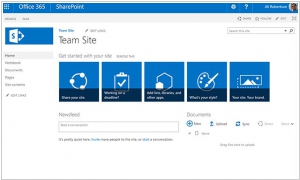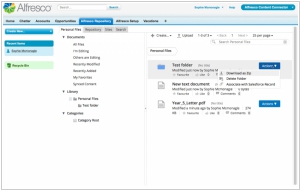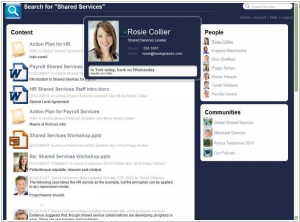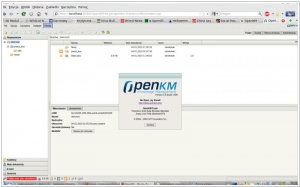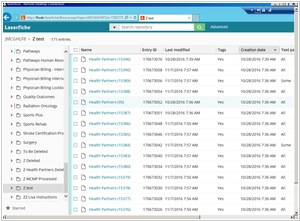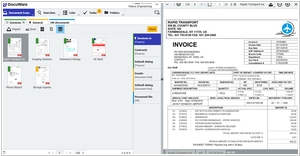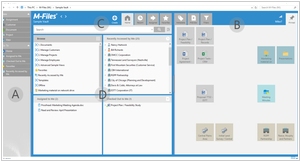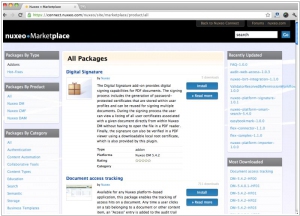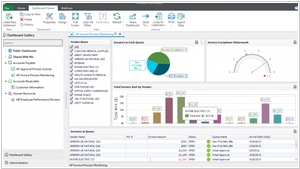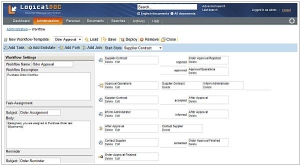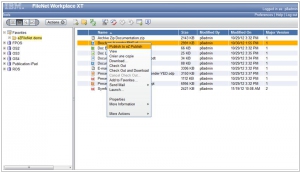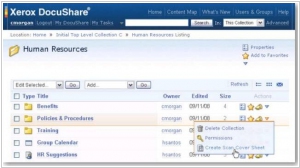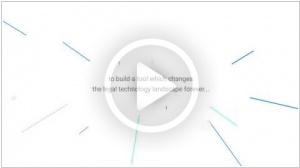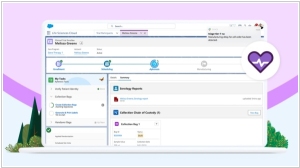Top 10 Enterprise Content Management software
February 03, 2024 | Editor: Michael Stromann
14
Enterprise Content Management (ECM) software provides document and records management, content taxonomies, auditing capabilities, check-in/check-out and other workflow controls and security mechanisms that allow to obtain, organize, store and deliver information.
1
SharePoint's multi-purpose platform allows for managing and provisioning of intranet portals, extranets and websites, document management and file management, collaboration spaces, social networking tools, enterprise search, business intelligence tooling, process/information integration, and third-party developed solutions. SharePoint can also be used as a web application development platform.
2
Alfresco is a Free enterprise content management system for Microsoft Windows and Unix-like operating systems. Alfresco includes a content repository, an out-of-the-box web portal framework for managing and using standard portal content, a CIFS interface that provides file system compatibility on Microsoft Windows and Unix-like operating systems, a web content management system capable of virtualizing webapps and static sites via Apache Tomcat, Lucene indexing, and Activiti workflow. The Alfresco system is developed using Java technology.
3
OpenText products help organizations put content to work. Whether your goal is to drive revenue, improve productivity, reduce costs or ensure regulatory compliance and sound information governance, OpenText has the product to execute.
4
OpenKM is a web base document management application that uses standards and Open Source technologies. OpenKM provides full document management capabilities including version control and file history, metadata, scanning, workflow, search, and more. It also allows the social activities around content to be used to connect people to other people, information to information, and people to information; helping to manage, more efficiently, the collective intelligence of the human resources of the company.
5
Laserfiche content management, business process automation and data analytics deliver rapid ROI for your organization. Get work done faster with the leading cloud content services platform — featuring low-code process automation, secure content management, intelligent content capture and prebuilt integrations.
6
Document management and workflow automation software. DocuWare digitizes and secures your information to flow effortlessly between your decision makers — anywhere, any device, any time.
7
The M-Files metadata-driven document management platform enables knowledge workers to instantly find the right information in any context, automate business processes, and enforce information control. This provides businesses with a competitive advantage and substantial ROI as they deliver superior customer experiences and higher-quality work with lower risk.
8
Nuxeo provides an Open Source Content Management Platform enabling architects and developers to easily build, deploy, and run content-centric business applications. In the cloud or on premise, Nuxeo's Enterprise Content Management (ECM) technology offers an integrated solution for Document Management, Case Management, Digital Asset Management and much more. Built on a modern, Java-based architecture, the Nuxeo Platform is architected for modularity and extensibility, unlike traditional ECM solutions.
9
OnBase, Hyland’s flagship product, is a single enterprise information platform designed to manage your content, processes and cases. OnBase centralizes your important business content in one secure location, and then delivers relevant information to you when you need it, wherever you are. Increase productivity, deliver excellent customer service and reduce risk across your entire enterprise.
10
LogicalDOC is a document management system software easy-to-use, reliable and affordable, which can improve your business efficiency. The installation and implementation of LogicalDOC's Document Management System software is easy. Irrespective of the type of organization whether large or small, the support, licensing and optional packages are all affordable. LogicalDOC - DMS (Document Management System) greatly facilitates how one manages and process important documents, this eases your job and saves you a lot in terms of monetary value and time waste.
11
IBM ECM delivers high value solutions that can help companies transform the way they do business by enabling them to put content in motion: capturing, activating, socializing, analyzing and governing it throughout the entire lifecycle. FileNet Content Manager provides powerful document management and ready-to-use workflow that helps you capture, manage, and share content.
12
DocuShare is one of the most flexible, easy-to-use content management platforms on the market today. It manages a wide range of paper and digital content and automates your business processes so your organization’s, customers, constituents, and partners can efficiently access, share and process business critical information 24 x 7.
Latest news about Enterprise Content Management software
2022. OpenText acquires Micro Focus for $6B

ECM giant OpenText is acquiring Micro Focus for a total value of $6 billion. Micro Focus, a British company, has primarily expanded its business by purchasing legacy software companies such as Borland, Novell, and Cobol-IT. One of its most prominent agreements was a $8.8 billion partnership with HPE in 2016, focusing on a part of HPE's enterprise software portfolio, including the well-known Autonomy deal. While OpenText's content management roots do not directly align with most of Micro Focus' offerings, this acquisition seems to be driven by the desire to grow and expand rather than pursuing immediate synergy with the acquiring company.
2021. Sanity raises $39M for its “use-anywhere” approach to content repositories
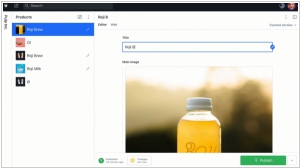
A startup called Sanity has recently secured $39 million in funding. The company has developed a system that simplifies the repurposing and utilization of content assets across various platforms, while also enabling the seamless use of data as content. By adopting a programmatic approach to content, Sanity offers companies a structured yet schema-less "content lake." This unique feature empowers organizations to leverage content across multiple use cases, which is a significant departure from the conventional practice of storing content in silos created for specific purposes. This innovation addresses the limitations often encountered in CMS systems, including traditional headless CMS systems, which tend to impede efficient repurposing, leading to slow and error-prone processes that strain business resources.
2021. Templafy raises $60M for its B2B SaaS platform that does business document creation
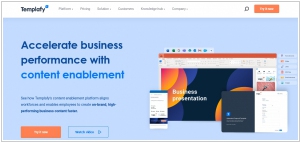
Templafy, a B2B SaaS platform originally from Denmark, has successfully raised $60 million in a Series D funding round. While there is some overlap with PandaDoc, Templafy distinguishes itself by primarily targeting enterprise customers, making it versatile across various use cases. The platform's core objective is to assist employees in creating a wide range of business documents and content within any application they use. Whether it's Office, Google, Salesforce, Teams, or Slack, Templafy empowers users to generate professional and tailored materials from their preferred work environment. Unlike other solutions that are specifically tailored for certain use cases, such as sales, Templafy takes a horizontal approach, catering to multiple use cases throughout large enterprises.
2020. Hyland to acquire Alfresco
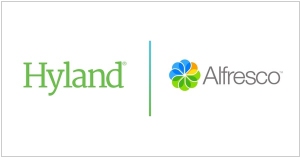
Hyland, a provider of content services, has entered into a definitive agreement to acquire Alfresco, a leading open-source ECM platform. Founded in 2005 by John Newton (co-founder of Documentum) and John Powell (former COO of Business Objects), Alfresco has established itself as a prominent player in the open-source ECM space. Based in Boston, Alfresco specializes in developing a cloud-native digital business platform that offers content services solutions to connect, manage, and safeguard critical information for organizations. Following the completion of the transaction, the entire Alfresco business is expected to be integrated into Hyland Software, Inc. This acquisition aligns with Hyland's vision of becoming a global leader in content services, expanding its presence worldwide and welcoming additional customers, partners, and highly experienced employees. Incorporating Alfresco's solutions enriches Hyland's portfolio of content services offerings and opens up new avenues for collaboration with the open-source community, driving product innovation.
2020. Templafy raises $25M to deal with enterprise documents
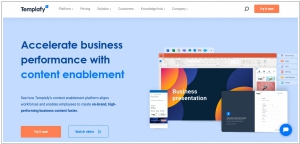
Templafy, a company that has developed a solution to simplify the creation of templates from standard documents for enterprises, has recently secured an additional $15 million in funding. Templafy seamlessly integrates with enterprise infrastructure, offering corporate content assets, document templates, and automated validation for created documents across various client profiles. While operating within multiple vertical categories, Templafy faces competition in areas such as Template Management (Litera), Creative Content (Frontify, Bynder), Sales Enablement (Showpad, Seismic), Proposal Management (Conga, PandaDoc), and Email Signature Management (Exclaimer, Xink).
2019. Salesforce announces new content management system
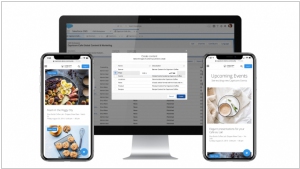
Salesforce has introduced an innovative tool named Salesforce Content Management System, specifically designed to enhance customer experiences across various channels. The primary goal is to enable customers to effortlessly create, manage, and deliver impactful content using the diverse range of Salesforce products. Remarkably, this tool does not necessitate extensive technical expertise, empowering marketers and product specialists to independently generate and distribute content without IT assistance, once the system is appropriately configured. While users can create personalized content based on customer insights derived from Salesforce data, the key distinguishing feature lies in its seamless integration with third-party systems. This hybrid CMS offers a native experience within Salesforce's own channels while also providing the flexibility to present content on any touchpoint built on third-party systems.
2019. Headless CMS company Strapi raises $4 million
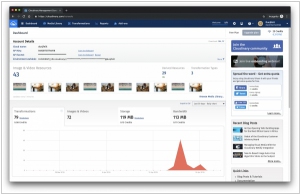
French startup Strapi, known for developing an open-source Node.js headless content management system, has successfully raised $4 million in funding. Strapi has gained significant popularity in the headless CMS arena, with over 500,000 downloads and the active participation of 250 contributors in the open-source project. The software can be easily downloaded and deployed on personal servers, allowing users to develop their own front end and retrieve content for their mobile applications using the Strapi API, among other functionalities. One of Strapi's standout features is the ability to customize the admin panel, displaying only the relevant fields needed when adding content. It also supports various databases, including SQLite, MongoDB, MySQL, and Postgres. In the future, the company plans to establish an ecosystem of plugins to enhance the features of their CMS installation. Additionally, there are potential plans to offer a hosted version of Strapi, alleviating the need for users to manage server infrastructure themselves.
2019. Contentstack raises $31.5M Series A round for its headless CMS platform
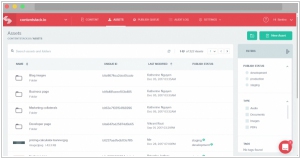
Contentstack, a startup that provides enterprises with a headless CMS platform, has recently secured a $31.5 million Series A funding. The company has experienced remarkable growth, with its revenue quadrupling in the first half of 2019 compared to the same period last year. While Contentstack has gained traction across various industries, it has seen particularly strong performance in retail, travel/hospitality, sports/entertainment, and technology sectors. Similar to many companies at the Series A stage, Contentstack plans to utilize the new funding to expand its sales and marketing team, enhance its partner ecosystem, and foster a thriving community around its product. Additionally, Contentstack aims to broaden its geographical reach beyond its primary regions of the United States, India, and Europe. The company has set its sights on the APAC region, specifically targeting Australia and New Zealand for expansion in the first half of 2020.
2019. AI contract management startup Icertis raised $115M
Icertis, the startup specializing in cloud-based software for contract management, has successfully secured $115 million in funding, propelling its valuation to over a billion dollars and solidifying its status as the latest Software as a Service (SaaS) unicorn. With Icertis, users can effectively oversee a wide range of contracts, including procurement, sales, and corporate agreements, as well as non-disclosure agreements. Alongside contract creation, Icertis' software actively monitors compliance with terms, ensures adherence to regulatory requirements, and automates administrative tasks such as sending renewal reminders. Currently generating approximately $100 million in revenue, Icertis aims to expand further in this critical domain.
2019. ContractPodAi scored $55M for its AI-powered contract management software
ContractPodAi, a startup based in London, has revealed that it has secured $55 million in Series B funding for its AI-powered contract lifecycle management software. The company provides a comprehensive solution covering the key areas of contract management, including contract generation, contract repository, and third-party review. Leveraging IBM's Watson AI technology, ContractPodAi aims to streamline the contract management process and alleviate the workload on in-house legal teams within corporations. Notable customers of ContractPodAi include Bosch Siemens, Braskem, EDF Energy, Total Petroleum, Benjamin Moore, and Freeview.
2019. Lexion raised $4.2M to implement AI for contract management
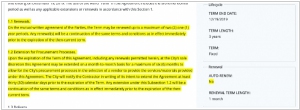
Lexion, a startup specializing in contract management, has successfully raised $4.2 million in seed funding. Incubated at the Allen Institute for Artificial Intelligence (AI2), Lexion benefits from the institute's expertise in applied machine learning solutions. Contract management is a critical challenge for companies of all sizes, and the need for visibility into contracts has grown significantly due to escalating regulatory and compliance requirements. Lexion focuses on the mid-market segment, recognizing the opportunity to provide a solution that bridges the gap between expensive enterprise software (like Salesforce in the CRM space) and the array of products available in the mid-market. With the newly secured funding, Lexion aims to further develop its product, particularly its AI engine, and strengthen its go-to-market and sales strategies.
2018. Seismic acquires KnowledgeTree
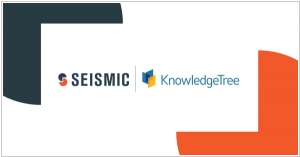
Seismic has announced its acquisition of SAVO Group, a fellow provider of sales and marketing enablement solutions. SAVO Group had previously acquired KnowledgeTree, a sales and marketing content management provider, a year ago. The consolidation of these companies is expected to strengthen Seismic's position in the sales enablement market. According to Doug Winter, the co-founder and CEO of Seismic, sales enablement programs have proven to be highly influential in driving revenue for enterprises by relieving sellers of various responsibilities and allowing them to focus on cultivating strong buyer relationships. However, to fully leverage the benefits of such programs, a robust sales enablement solution is crucial. With this acquisition, Seismic aims to establish a significant lead over its competitors in the sales enablement market.
2017. OpenText acquired forensic security vendor Guidance Software
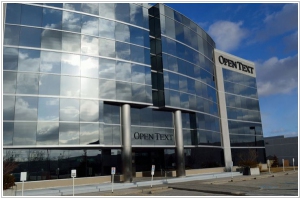
Forensic security and eDiscovery vendor Guidance Software has been acquired by content management company OpenText in a deal worth $240 million. OpenText has demonstrated a willingness to invest in strategic acquisitions to fill gaps in its portfolio, even if it means acquiring companies with overlapping functionality. A notable example is its acquisition of Documentum, an alternative enterprise content management firm, from EMC for $1.62 billion approximately a year ago. While this acquisition may introduce some overlapping functionality, it also grants OpenText access to new forensic tools—a domain previously unexplored by the company. According to Cheryl McKinnon, an analyst at Forrester Research specializing in the content management industry, this move expands OpenText's capabilities and expertise in forensics.
2016. Alfresco is available as a managed service on AWS
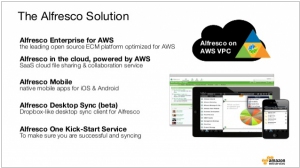
Alfresco, a renowned provider of enterprise content management (ECM) and business process management (BPM) software, has recently unveiled the early release of its platform as a managed service, now hosted on Amazon Web Services (AWS). This development enables users to conveniently access the platform as a single-tenant managed service within an AWS Virtual Private Cloud (VPC) environment. Furthermore, Alfresco is taking steps to streamline cloud deployment for customers who self-manage their AWS infrastructure, making it more accessible and hassle-free.
2016. OpenText acquires Documentum for $1.62 billion
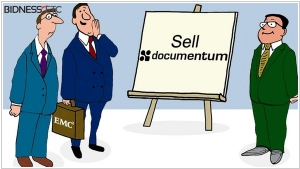
OpenText is set to purchase Dell EMC's enterprise content division, which includes Documentum, for a total of $1.62 billion. As per the agreement, OpenText will integrate the software, associated services, and employees of ECD into its operations. This acquisition comes shortly after Dell's official merger with EMC, where EMC's content management business was deemed incompatible. In 2003, EMC acquired Documentum for $1.7 billion, although it was widely known that EMC had been actively seeking a buyer for Documentum in recent years. With this acquisition, OpenText solidifies its position as a leading provider in Enterprise Information Management and now directly competes with IBM's FileNet.
2016. OpenText acquired Recommind
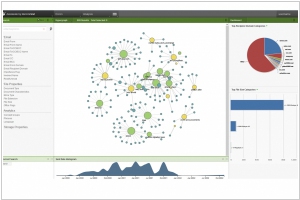
Just one week following the announcement of OpenText raising $600 million through the sale of senior debt notes to support future acquisitions, the company has made a significant investment of $163 million to acquire Recommind, a provider of e-discovery and information analytics solutions. Recommind offers a Software-as-a-Service (SaaS) platform along with managed services, including Axcelerate for e-discovery review and analysis, Perceptiv for contract analytics, and Decisiv for enterprise-wide information access. OpenText officials have expressed that the addition of e-discovery capabilities will complement their existing enterprise information management (EIM) solutions. Furthermore, the acquisition of Recommind will enhance OpenText's proficiency in cloud services and analytics, expanding their overall expertise in these domains.
2016. EMC wants to sell Documentum
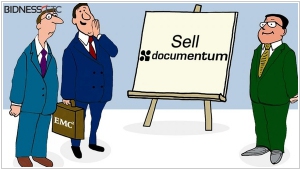
In anticipation of the Dell acquisition, EMC is currently seeking to sell its enterprise content management product, Documentum. Documentum is widely recognized as one of the pioneers in the ECM field. However, as companies increasingly shift away from costly and time-consuming monolithic tools, the market for ECM is starting to show its age. Documentum has made efforts to adapt over the years, with its latest initiative called Project Horizon, aimed at transitioning to the cloud and simplifying the complexities associated with enterprise content management software. It seems that Dell may not perceive significant value in EMC retaining Documentum, and the sale of the product will likely alleviate some concerns for Dell as the acquisition progresses throughout the year.
2016. Alfresco integrates its ECM and BPM
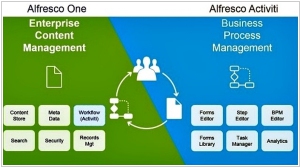
Alfresco has unveiled a significant integration between its enterprise content management (ECM) platform, Alfresco One, and its Business Process Management (BPM) platform, Activiti. This marks the culmination of years of concerted efforts to bring the two platforms closer together, effectively enhancing the functionality of both in managing business content and processes. With this announcement, Alfresco enters the competitive Process and Collaboration Management (PCM) market, providing enterprises with a comprehensive suite of offerings encompassing content management and content-driven processes. The integration seamlessly combines BPM, ECM, records management, and includes integrations with capture and e-signature vendors, delivering a holistic solution for enterprises in need of robust process and collaboration management capabilities.
2015. Alfresco enhanced integration of its ECM and BPM systems
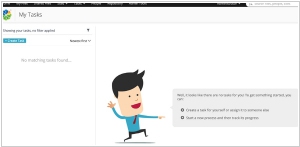
Alfresco is enriching its ECM (Enterprise Content Management) and BPM (Business Process Management) platforms, namely Alfresco One and Activiti, through the introduction of new modules for analytics and media management, as well as enhanced BPM capabilities. These newly released components bring additional functionality to the platforms and foster closer integration between BPM and ECM. The enhancements build upon Alfresco's open-source BPM offering, which had already been adopted by many enterprises as a standalone BPM engine in their applications. Now, as an enterprise version, Activiti v1.0 offers seamless integration with Alfresco Share, Alfresco's collaborative tool. In addition, Alfresco has unveiled an Analytics Module, which can be integrated with any of the Alfresco products, providing valuable insights and reporting capabilities regarding content, processes, and events related to individuals.
2014. Alfresco raises $45M to fight with EMC and Microsoft
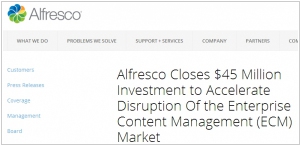
UK-based Alfresco, a startup specializing in open-source enterprise content management, has secured Series D funding of $45 million. This investment exceeds the cumulative amount raised in all of its previous funding rounds combined. Alfresco is in competition with established services like EMC Documentum and Microsoft SharePoint, providing solutions for large organizations to effectively manage their diverse document storage across both cloud and on-premises environments. It offers features such as version control and compliance requirements across various devices, including mobile and PC. With the new funding, Alfresco plans to accelerate its business operations by enhancing sales and marketing efforts and expanding its range of cloud-based services. This expansion may result in direct competition with popular platforms such as Dropbox, Box, and Huddle.
2012. EMC buys file syncing service Syncplicity
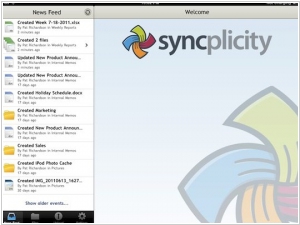
The conquest of the Enterprise continues for Dropbox for Business. EMC, the developer of the largest and most intricate enterprise content management system Documentum, has recently acquired Syncplicity, a small file storage and syncing service. This acquisition is expected to enable Documentum users to access and work with files stored in the ECM system from their mobile devices. It's worth noting that EMC has a subsidiary, VMWare, which is developing its own similar service called Project Octopus. However, it seems that EMC couldn't afford to wait any longer, as this matter required immediate attention. Interestingly, Open Text, the main competitor in the ECM market, had already launched a file syncing service called Tempo at the beginning of the year. Syncplicity, one of the early competitors of Dropbox, may not have achieved the same level of popularity, but it had a strong focus on the business sector and boasted more robust security features compared to Dropbox.
2012. Open Text and Liferay create Dropbox clones
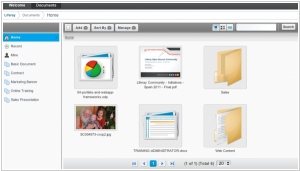
Could you have imagined just a few years ago that esteemed enterprise vendors like Open Text and Liferay, known for developing sophisticated enterprise content management systems (ECM), would emulate a seemingly straightforward consumer service like Dropbox? Surprisingly, it has become a reality. Even within large corporations that heavily rely on ECM, employees are ordinary individuals who desire a seamless working experience. They too seek systems that facilitate their work instead of hindering it, and many of them resort to using Dropbox despite IT administrators prohibiting its usage. As a result, a single solution emerges: to create a similar user-friendly service that abides by the corporate firewall. This very concept underlies the introduction of the new services: Open Text Tempo and Liferay Sync. These services enable file synchronization between desktop folders, web accounts, tablets, and smartphones, facilitating quick file sharing among colleagues while ensuring the files are stored securely on corporate servers. It's that simple.
2011. EMC offers Documentum in the Cloud and on the iPad
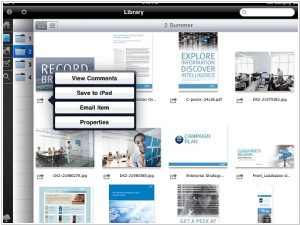
It's always a pleasure to watch, when a software giant's senior manager is talking from the stage that: "guys, customers do not want to tinker with the software, they need on-demand solutions ... it's time to move the software to the Cloud." In this case we are talking about EMC. On the video - Paul Maritz, president of VMWare (which is owned by EMC), talking about the benefits of cloud technologies and presenting (of course, revolutionary) platform EMC OnDemand. This platform will be used to host the wide range of applications by EMC and its partners, but for now it provides on the well-known content management systems EMC Documentum, EMC Captiva and EMC Document Sciences. Although Documentum alrady has a set of web-interfaces, the access to the cloud version is implemented via the VMWare's virtualization technologies. ***
2011. Alfresco created collaboration system for SMB
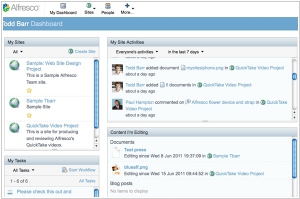
Alfresco's content management and collaboration system gained its big popularity thanks to the low pricing and availability of free open-source edition. But still it's pretty complicated solution that doesn't fit small business. But now Alfresco decided to fix this issue and released Alfresco Team which is designed for content collaboration in departments and small companies. It reminds Sharepoint Team Site or Box.net, but more functional and cheap. Users can create sites (workspaces) with different pages - document libraries, calendars, wiki, task lists, blogs, forums. Alfteso Team's functionality includes social tools (comments, ratings, Like buttons), activity streams, web-viewer (which lets you view even videos and audio files), mobile versions for iPhone and iPad, workflow-engine (implemented on Alfresco BPM), document converter (eg doc -> pdf). ***
2010. Document Management goes 2.0: Alfresco vs SharePoint
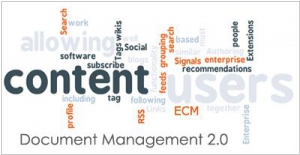
Document management systems (DMS) and related to them Enterprise Content Management systems (ECM) like all other IT solutions are gradually embracing Enterprise 2.0 technologies. This is a difficult move for them. Because DMS and ECM - are quite old and conservative technologies/systems and it's always difficult to change for old school. Besides the main DMS and ECM users are large companies and it's very difficult to upgrade them to the next level. Nevertheless, the progress goes on. Let's take a look on how the Enterprise 2.0 technologies are implemented in DMS and ECM nowadays: ***
2010. Alfresco Enterprise 3.3 - CMIS support, integration with Drupal, Outlook and Google Docs
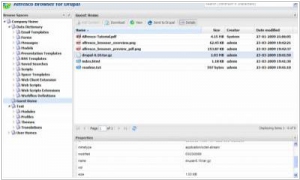
Alfresco has recently unveiled the latest version of its commercial open-source ECM system, Alfresco Enterprise 3.3. The key highlight of this update is its integration capabilities with other content systems via the CMIS interface. Alfresco is the pioneering ECM vendor to offer complete support for CMIS in its product. With CMIS, business applications can seamlessly access content stored in the Alfresco database. The new version introduces integration with Drupal, Outlook, and Google Docs, following Alfresco's previous integration efforts with IBM products such as Lotus Notes, WebSphere Portal, Lotus Quickr, and Lotus Connections. Alongside the expanded integration opportunities, Alfresco 3.3 presents an enhanced web interface for its collaborative tool, Alfresco Share. This interface boasts improvements in the access control system, record management, custom lists (similar to SharePoint, such as tasks, activities, and companies), and a Google-like search query syntax. Additionally, we would like to highlight the new Alfresco Web Editor, which enables non-technical staff to create and edit pages with ease.
2009. Adobe LiveCycle ES goes to the Cloud
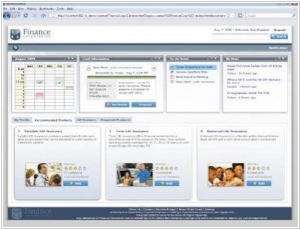
Adobe has announced the new "cloud" version of its ECM system Adobe LiveCycle ES. It can be hosted on Amazon Web Services platform. Adobe also offers own hosting service for LiveCycle ES including 24/7 maintenance and support. The new version LiveCycle ES 2 features two new modules: LiveCycle Mosaic and LiveCycle Workspace ES 2 Mobile. The first is for the building internal portals - rich personalized interfaces that provide access to the data stored in LiveCycle ES in the form of widget "mosaic". The second - provides mobile access to the system on iPhone, BlackBerry and Windows Mobile. Besides, users can access the system via browser using Flash, AIR desktop client or directly from a PDF document (opened in Adobe Reader). ***
2009. CenterStage launched Sharepoint alternative for Documentum users

CenterStage is a collaboration solution introduced by EMC last year alongside the new version of Documentum. Initially, only the light version called CenterStage Essentials, which offers basic collaboration tools, was unveiled. However, the full-featured version, CenterStage Pro, is now available. CenterStage Pro boasts various Web 2.0 tools such as personal workspaces, a powerful search engine, wikis, blogs, and more, making it comparable to Microsoft SharePoint. One notable advantage of CenterStage is its ability to manage version history for not only documents but also other types of records such as blog posts, wiki pages, and discussions. However, it does lack workflow automation and metadata support when compared to SharePoint. It's important to note that CenterStage cannot be seen as a standalone competitor to SharePoint since it relies on integration with the Documentum ECM platform. Nevertheless, for companies already utilizing Documentum but haven't implemented SharePoint, CenterStage proves to be an appealing solution.
2009. Open Text launches social interface
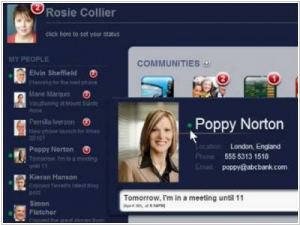
Open Text has recently introduced a new module for its ECM platform called Open Text Social Workplace, designed to assist organizations in implementing social tools. The company recognizes that traditional collaboration tools are no longer sufficient for intranet collaboration. Users now demand more user-friendly social tools and are willing to utilize them, even without IT compliance. However, it is crucial for companies that deploy these social tools to address potential security concerns. The new Open Text social interface offers an extensive array of collaboration tools, including communities, profiles, blogs, wikis, personal home pages, and mobile access (available for iPhone and BlackBerry). Furthermore, these features are accompanied by compliance management, similar to that used for managing enterprise email.
2009. Alfresco to provide cloud ECM
rephrase in one paragraph: Alfresco, open source ECM provider, announced a partnership with ParaScale, a cloud storage software provider, to offer Alfresco "Content as a Service". In enterprise deployments of ECM solutions, the traditional model is separate hardware for front-end and back-end (multiple this model based on usage requirements). It's the model that Alfresco would typically recommend to its clients. ParaScale looks to change that model. The Alfresco, ParaScale partnership enables the Alfresco Enterprise CMS to reside on the same servers that support the cloud infrastructure. This includes all aspects of the Alfresco platform (front-end and content repositories). The Alfresco software can be installed on one or more of the Storage Nodes on the ParaScale Platform. You can start your cloud storage solution small and grow it as required without a great deal of changes. You simply add a new Storage Node and make the required clustering configuration changes in Alfresco (okay, there's a little more than that, but it's not complicated).

